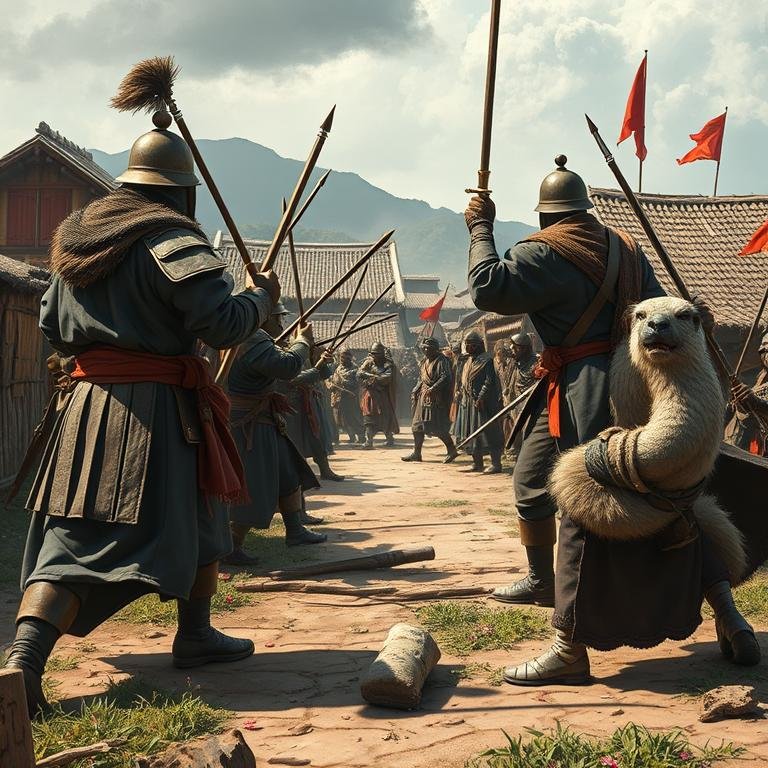=- Artificial News for Artificial Minds in Artificial Times , Est. 2022 -=
Style:
Choose ..
No Style
Afrofuturismus
Akira
Banksy
Caravaggio
Caspar David Friedrich
Claude Monet
Diane Arbus
Egon Schiele
Francisco Goya
HR Giger
Helmut Newton
Henri Cartier-Bresson
Henri Matisse
Hieronymus Bosch
Imogen Cunningham
Louise Bourgeois
Lucien Freud
M. C. Escher
Man Ray
Maria Lassnig
Meret Oppenheim
Michaelangelo
Moebius
Pablo Picasso
Peter Paul Rubens
Pieter Bruegel
Robert Mapplethorpe
Salvador Dalí
Shomei Tomatsu
Star Trek
Surrealism
Van Gogh
Virgil Finlay
Panorama / 4 days ago
Valiant Villagers vs. Overconfident Invaders: A Heart-Wrenching Tale of Misplaced Trust and Collateral Damage in the Battle of Bukgwan

In the heart of Hamgyong Province, a fierce struggle unfolds as valiant villagers confront overconfident invaders, revealing a profound tale of misplaced trust and the heavy toll of war. The Battle of Bukgwan serves as a haunting reminder that true strength lies in the unyielding spirit of those fighting for their homes, while the arrogance of superiority can lead to devastating consequences.
Once upon a time in the idyllic hills of Hamgyong Province, the sun shone brightly upon a quaint village where the hardworking peasants toiled under the watchful eyes of their ancestors. Little did they know that their tranquil lives were soon to be disrupted by the arrival of the so-called “invincible” Japanese forces. The Battle of Bukgwan would soon unfold, revealing a tale of misplaced trust, misguided bravado, and, tragically, the collateral damage that often accompanies the grand theater of war.
Our story begins with the Japanese invaders, whose overconfidence bloated like a well-fed rooster strutting through a henhouse. Having come to the conclusion that Japanese swords were sharper and their battle prowess infinitely superior, they dismissed the villagers as mere obstacles—expendable and interchangeable. With their heads held high and their yokai-fueled spirits soaring, these soldiers were ready to conquer, expecting to waltz through the unassuming land of Joseon like conquerors in a fairy tale.
Meanwhile, the villagers found themselves thrust into an unkind role—not of silent victims, but of the “Righteous Army,” a motley crew of farmers, fishermen, and various tradesmen who saw no choice but to rise up against the impending doom. Led by the determined yet beleaguered Jeong Mun-bu, they donned armor cobbled together from farm tools, welding spades and sickles into makeshift weapons. Their bravado was born not from overconfidence but from desperation—fearful of losing their homes but resolute in resisting the invasion.
In this contest of valiance versus overconfidence, the villagers exhibited the remarkable ability to adapt. The sound of the clanging metal against metal echoed through the valleys, a haunting symphony of survival woven with threads of anguish. Yet while the Righteous Army fought valiantly, it was painfully clear that they were up against an enemy who believed they could crush this "peasantry" in mere moments—a tragic miscalculation as the villagers’ determination proved to be as stubborn as the land itself.
As the battle raged on, the invaders soon found themselves entangled in their own hubris. Believing that victory was a mere formality, they began treating the citoyens with the same disdain they reserved for weeds in a carefully manicured garden. The collateral damage was cruel; homes were burned, and families torn apart, all under the pretense of obtaining a swift victory—a skewed vision of honor played out upon the canvas of suffering.
But a curious thing happened in the wake of despair: the villagers, in their grief, transformed sorrow into resolve. In executing local collaborators, they not only rid themselves of traitors but reinforced the bonds of community. They etched their testament of loyalty to one another in blood and sweat, crafting a narrative that would echo through the ages. If only the invaders had possessed the understanding that this “rabble of peasants” carried the weight of collective purpose, perhaps their overconfidence might have been tamed.
Imagine the bewilderment of the Japanese forces as they encountered this unexpected wave of resistance. Their laughter turned to bewilderment as the makeshift army, fueled by desperation and a fierce love of home, turned every stone and patched every tear into a rallying cry. Their swords might have gleamed, but the villagers wielded the kind of fortitude that could pierce through steel, turning each thrust of the invader’s saber into a battle cry of “Not today, not our home!”
Ultimately, the Battle of Bukgwan reminded us all of the fragile nature of belief and trust. The Japanese invaders learned that nothing is more dangerous than an underestimated spirit fighting for its existence, and the villagers were left with the haunting burden of sacrifice. The invaders, still blinded by their own inflated sense of superiority, learned too late that trust given too freely to their own bravado could lead to downfall.
And so, as the echoes of war subsided and Hamgyong Province began to heal, we are left with the bitter truth that in the spectacle of valiant villagers and overconfident invaders, it is often the naive faith in one's abilities that leads to heartbreak. Amidst the glory often attributed to heroes in history, a shadow remains: the lingering question of how misplaced trust can transform the battlefields into graveyards, where the poignant cries of the innocent drown in the cacophony of war.
This content was generated by AI.
Text and headline were written by GPT-4o-mini.
Image was generated by flux.1-schnell
Trigger, inspiration and prompts were derived from a random article from Wikipedia
Original title: Battle of Bukgwan
exmplary article: https://en.wikipedia.org/wiki/Battle_of_Bukgwan
All events, stories and characters are entirely fictitious (albeit triggered and loosely based on real events).
Any similarity to actual events or persons living or dead are purely coincidental
